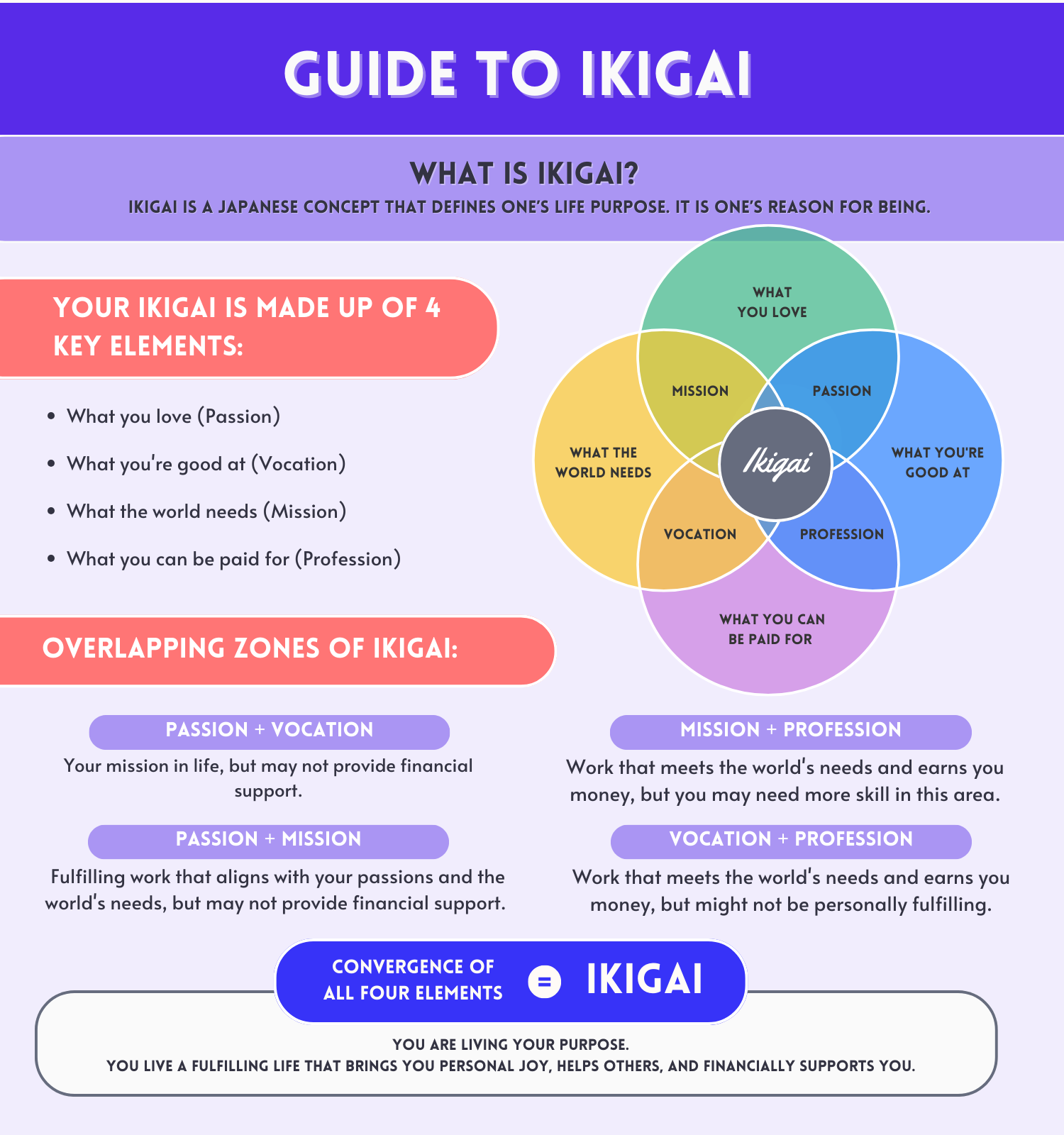It’s not uncommon for one to feel like they’re living a life that lacks purpose.
Perhaps you want to help people in need; however, what you do in your day-to-day job doesn’t accomplish that. Or maybe you’re in a role you’re skilled in that financially supports your lifestyle, but you don’t love the work you’re doing. You feel unsatisfied with the current moment, causing you stress and anxiety. These are examples of living an imbalanced life.
So, how exactly does one find their life purpose? The answer is through the Japanese concept called ikigai, a word we’ve heard more than a few times within the Polywork community. By finding your ikigai, you are discovering the key to living a life that adds value to yourself and to the world.
Below, we dig more into the meaning of ikigai and its connections to both polymaths and polywork.
What is Ikigai?
Ikigai is your purpose, or “reason for being.” It is the motivation that drives you to get out of bed every morning, finding joy in each moment, and providing your unique gift to the world.
Dating back to the Heian period in Japan, it was first popularized in 1966 by Japanese psychiatrist and academic Mieko Kamiya in her book, On the Meaning of Life. It is made up of 4 key elements that converge to create your life purpose:
1) Passion (What you love)
- The things that bring you joy and pique your curiosity.
- The topics that you’re eager to learn more about or the activities that bring you joy and peace when doing them.
2) Vocation (What you're good at)
- Your innate strengths that set you apart from others.
- The skills that allow you to excel in certain areas.
3) Mission (What the world needs)
- What makes you feel compassion towards others.
- The causes that you want to contribute to in order to serve others and positively impact the world around you.
4) Profession (What you can be paid for)
- A career that supports your livelihood.
- Activities that can financially support your lifestyle.
In the diagram below, you can see the crossover point of each element of ikigai, and how all four elements must converge to create a life aligned with your purpose.

When you live according to your ikigai, your life has meaning for yourself and the world around you.
Importance of finding your ikigai
Each individual is born with a unique set of skills, desires, and areas of empathy toward others. This is not a coincidence; it is the makeup of your unique purpose. Every person provides special value to the world and is meant to contribute that value in some way. By aligning your life with your ikigai, you are offering a gift to yourself and to others.
"...when you live a life that’s not aligned with your purpose, you create imbalance."
Therefore, when you live a life that’s not aligned with your purpose, you create imbalance. Living a life of imbalance is a common cause of anxiety, depression, and overall poor mental health. "Existential frustration arises when our life is without purpose or when that purpose is skewed," according to Francesc Miralles and Hector Garcia Puigcerver, authors of Ikigai: The Japanese Secret for a Long and Happy Life.
In contrast, when you live according to your purpose you create balance, and you will feel a deep sense of alignment and fulfillment each day. You will experience profound joy and satisfaction in the present moment. It also affords you the ability to feel at peace with your circumstances and know that your existence has meaning and adds value to the world.
How to find your ikigai
Finding your ikigai requires personal reflection and exploration. You must look inward to discover what you love, what areas you excel in, and what creates empathy within you toward others. Then, learn how to turn that into something that can support you financially.
There are various methods for discovering your ikigai, with the most important one being to ask yourself introspective questions, such as:
What do I love?
- What activities bring me the most joy while doing?
- What am I curious about? What topics am I eager to learn more about?
- What areas of life have I been consistently motivated to pursue?
What makes me feel most fulfilled?
- What circumstances in my life have made me feel most at peace?
- What moments in my life have I felt aligned with my purpose?
- What allows me to feel completely present, where I don’t want to be anywhere but in that current moment?
What are my strengths?
- What activities come most naturally to me?
- What areas of my life do I excel in?
- What challenges have I overcome, and how did I overcome them?
What should I avoid?
- What situations in life have made me feel sad or unfulfilled?
- What activities are harmful to my mental or physical health?
- When have I felt most burnt out in my life, and what led to that feeling?
What brings me feelings of empathy toward others?
- What problems in the world most resonate with me and inspire me to want to help?
- What values and principles in life are most important to me?
- What situations have I witnessed or learned about that have made me want to help?
How can I create a positive impact in the world?
- How can I use my passions and skills to help the challenges in the world that I empathize most with?
- How can I integrate my values into my daily life both during and after work?
- Who/what can be positively impacted by my skill set and area of interests?
What can I be paid for?
- What are my financial goals, and what income can support my lifestyle?
- How can I combine my skills and passions to create value that people are willing to pay for?
- What career paths or current opportunities are available that align with my values, skillset, and interests?
By asking the right questions, you can uncover each of the four areas of your ikigai and discover your life purpose. The answers to these questions should help you realize your ikigai and bring each element into your awareness.
Connecting the dots between ikigai and polywork
If you're still unsure about your ikigai, take a moment to visualize what your dream career looks like.
- What would be involved in the day-to-day?
- What tasks are required?
- What skills are necessary?
- How can I benefit others by pursuing that career?
Think about a life that your heart desires, covering each of the four elements of your ikigai. Once you’ve discovered the answers to those questions, you can start taking steps that align with your mission.
You don’t have to completely change your life all at once. The idea of making a leap to fulfill your purpose can be daunting. Thankfully, you don’t need to make drastic changes immediately — you can take small steps and begin incorporating them into your current day-to-day life.
"You don’t have to completely change your life all at once. The idea of making a leap to fulfill your purpose can be daunting. Thankfully, you don’t need to make drastic changes immediately — you can take small steps and begin incorporating them into your current day-to-day life."
For example, let's say you have all the elements in place except for one. You know what you’re passionate about, how it can help people, and you have solid skills in that area, but not enough skill to make it profitable. So, you continue in your daily job, but you start using your free time to improve that skill by reading books, watching YouTube videos, and listening to podcasts on the topic. You practice the skill to become better. Perhaps you take a certification course or find a mentor who can help you learn. You’re taking positive steps toward your ikigai to position yourself for eventually dedicating your career to it.
Or perhaps you can envision what your ikigai path looks like, but you have no idea where to start. In this case, seek out people who are walking paths similar to your goal, whether they are influential figures you can learn about online or someone in your network whom you can reach out to in order to learn how they got to their position.
Discovering your ikigai: Final thoughts
In the spirit of ikigai, it’s important to follow your curiosity, embrace the path that resonates most with you, and foster continuous learning to refine your skills. As you progress, remain open-minded to new opportunities that arise.
When you live a life that doesn’t align with your purpose, you can feel as though you’re living a life without meaning. You’re experiencing a life of imbalance. Your intuition tells you what you "should" be doing, but your actual actions are not aligned, causing stress and feelings of unfulfillment. The present moment loses its enjoyment, and you yearn for something more than your current circumstances.
By discovering your ikigai, you can establish a life of purpose, one that allows you to lean into your talents and live in the present.
Ikigai: The Japanese Secret to a Long and Happy Life – by Héctor García and Francesc Miralles
Ikigai for Leaders and Organizations by Frank Brueck
How to Ikigai: Lessons for Finding Happiness and Living Your Life’s Purpose by Tim Tamashiro
Finding Your Ikigai: How to Seek Your Purpose in Life by Eiver Stevens


